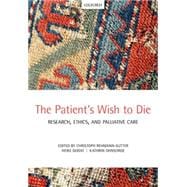Wish to die statements are becoming a frequent phenomenon in terminally ill patients. Those confronted by these statments need to understand the complexity of such wishes, so they can respond competently and compassionately to the requests. If misunderstood, the statements can be taken at face-value and the practitioner may not recognise that a patient is in fact experiencing ambivalent feelings at the end of life, or they may misinterpret the expressed wish to die as a sign of clinical depression.
Public debate about the morality and ethics of various end-of-life care options has exploded in recent years. However, it has never been sensitive to the finer aspects of clinical reality or the experiences of patients. The Patient's Wish to Die: Research, Ethics, and Palliative Care brings together that reality and the patient's voice, combining them with different research approaches. It presents the best available knowledge and research methodologies about patients' wishes at the end-of-life, together with a series of ethical views and a discussion about the clinical implications for palliative care. The book presents material in an open and unbiased manner whilst remaining sensitive to the spiritual and existential dimensions of dying, and to the different cultural views that provide meaning to the individual.
Written by the best specialists and ethics scholars from around the world, including palliative care practitioners and end-of-life scholars from countries where assisted dying practices are legalized and from those where it isn't, The The Patient's Wish to Die: Research, Ethics, and Palliative Care will prove essential reading for all those working or studying in the field of palliative care.








